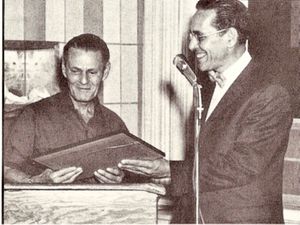Walter Allen: Difference between revisions
Jump to navigation
Jump to search
(Created page with "Category:People [[File:Walter H Allen receiving LiveSteamMagazineAward.jpg|thumb|center|300px|The late Walter H. Allen is presented with the Live Steam Magazine Award for...") |
No edit summary |
||
| Line 6: | Line 6: | ||
[[William Fitt|William C. Fitt]] wrote the following about Walt in <i>[[Modeltec]] Magazine</i>, August 1986: | [[William Fitt|William C. Fitt]] wrote the following about Walt in <i>[[Modeltec]] Magazine</i>, August 1986: | ||
: The late [[Walter Allen|Walter H. Allen]] started the Pattern Pool many years ago. He collected patterns from the Live Steamers who had obtained the castings they needed and had no further use for them. He warehoused, cataloged and loaned them to anyone with access to a foundry or, if casting service was unavailable, Walt took them to a local foundry for castings and shipped them to the hobbyist | : The late [[Walter Allen|Walter H. Allen]] started the Pattern Pool many years ago. He collected patterns from the Live Steamers who had obtained the castings they needed and had no further use for them. He warehoused, cataloged and loaned them to anyone with access to a foundry or, if casting service was unavailable, Walt took them to a local foundry for castings and shipped them to the hobbyist. | ||
Revision as of 23:10, 10 September 2013
William C. Fitt wrote the following about Walt in Modeltec Magazine, August 1986:
- The late Walter H. Allen started the Pattern Pool many years ago. He collected patterns from the Live Steamers who had obtained the castings they needed and had no further use for them. He warehoused, cataloged and loaned them to anyone with access to a foundry or, if casting service was unavailable, Walt took them to a local foundry for castings and shipped them to the hobbyist.
